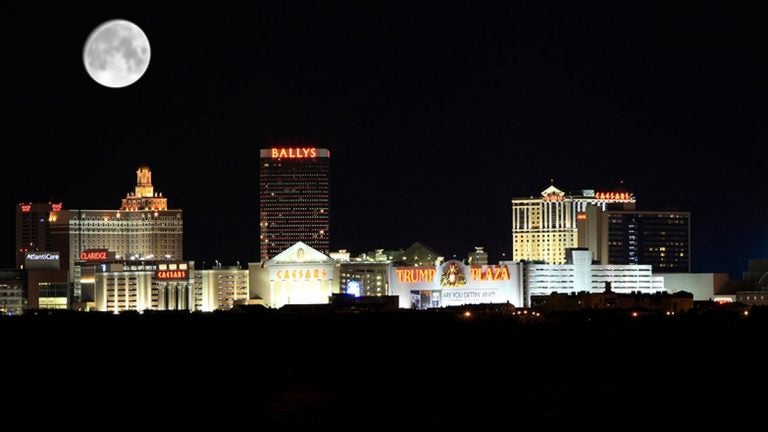Mayor envisions pot-friendly zones in Atlantic City if N.J. legalizes marijuana
Assembly begins hearings on legalizing recreational pot in Garden State.

Undated photo shows the Atlantic City skyline at night. (Big Stock Image)
This week the New Jersey Assembly began its first hearing into whether marijuana should be legalized and sold in retail shops in the Garden State. Many New Jersey towns are already debating whether to ban cannabis shops in their towns. But others, including Atlantic City, see it as a way to help jump-start economic activity beyond the Boardwalk.
Its biggest champion is the city’s new mayor, Frank Gilliam, who says he sees legalization not only as a fresh source of revenue but also as a matter of social justice.
Gilliam visited Las Vegas recently to explore how that town has integrated legal marijuana with its casinos and nightlife. In a recent interview, he outlined a vision of “adult entertainment districts,” where marijuana could be used freely, and visitors could enjoy restaurants, bars, spas and more.
“I don’t have the appetite to just be a pusher of the product. I don’t want people to think that they should just come here, buy it and leave,” Gilliam said, sitting down for an interview in a conference room of the seventh floor of City Hall. “I want it to be…a destination, where folks can come here and enjoy it in a controlled area.”
Atlantic City’s new mayor visited Las Vegas for three days in February as part of a tour organized by the New Jersey Cannabis Association, along with Nevada lawmakers. Gilliam said the Vegas casinos want no part of the cannabis business. He cited the tight federal regulations on gaming operations as likely to keep Atlantic City’s casinos out of that business as well. Soe enve in Trenton OKs legal weed, don’t expect marijuana shops inside the casinos and the bars won’t be toking zones.
That could mean an opening for small businesses, and to draw visitors out of the casinos and into Atlantic City neighborhoods.
One lesson from Vegas: The Nevada law did not allow for anywhere to legally smoke or vape marijuana except at home, which is not an option for a tourist. That would be part of his idea for a destination area.
“That could be good for Atlantic City. If we can roll it out correctly and create a destination facility or area, that would be ideal,” he said.
Gilliam hopes that could draw investment, and young vacationers. He cited both a plan for Stockton University to create a college campus in the city and a proposal to revitalize the boardwalk block of Tennessee Avenue as a block of millennial-friendly businesses as likely to bring a new generation to Atlantic City, a generation he believes will be more likely to explore beyond the casinos to frequent smaller businesses.
As introduced by Democratic state Sen. Nicholas Scutari, the latest version of a bill aimed at legalizing possession and highly regulated and taxed sale of marijuana would not allow for any public consumption. But in recent interviews, Scutari has signaled he could be open to the idea of consumption at clubs or in restricted areas.
The bill has met with some resistance, but legalization has the support of Gov. Phil Murphy.
While some shore towns move to keep dispensaries out of their jurisdiction, Gilliam is bullish on the possibility of new revenue and new visitors drawn by the idea of lighting up without worry of arrest.
Gambling remains the city’s dominant industry, but a string of five casino closures in a row hit hard, putting thousands out of work and decimating the city’s tax base. The city’s finances remain under state control, which clearly chafes Gilliam, and the city carries about $400 million in debt.
There is some hope. In addition to Stockton’s high-profile project, there are plans to renovate the former Showboat casino and a new owner lined up for the former Revel. An estimated $1 billion in new investment is expected to reshape neighborhoods throughout Atlantic City.
Gilliam believes legal cannabis could help drive that revitalization.
New Jersey is already among the majority of states that allow cannabis as medicine, flouting the federal position, and Murphy included legal weed as a campaign promise and has said he will sign legislation legalizing the drug if it reaches his desk.
A legalization bill has been introduced, as well as another that would decriminalize the drug rather than allow its sale. That would mean no tax boost from new dispensaries. If approved, it would mean a fine rather than criminal charges for possession of up to an ounce.
“That’s actually more important to me than the revenue,” said Gilliam, citing the disproportionate impact of marijuana arrests and convictions among minorities, despite statistically similar use as whites. “Because we’re an urban center, and most folks that have been harmed by the usage of cannabis have been African American and Hispanic.”
Those arrests and convictions have meant lost opportunities, and a criminal record can cost people jobs and even housing.
Gilliam cited Philadelphia and other cities, where municipal authorities have instructed police to put marijuana enforcement very low on their priorities. He said he has raised the issue with Atlantic City Police Chief Henry White and plans to discuss that with him in more detail.
Critics of the push for legal weed say it will do more harm than good, citing increased dangers of intoxicated driving, the potential for users moving toward harder drugs, and health concerns. Some critics say Denver has seen an increase in homelessness and a reluctance from some convention organizers to visit the city since Colorado became the first state to allow recreational pot.
But in Las Vegas, a desert town wholly dependent on tourism, dispensaries have proliferated since Nevada allowed them in July. Since then, dozens of dispensaries have opened in the town, often seen as a national mecca for vice.
WHYY is your source for fact-based, in-depth journalism and information. As a nonprofit organization, we rely on financial support from readers like you. Please give today.





